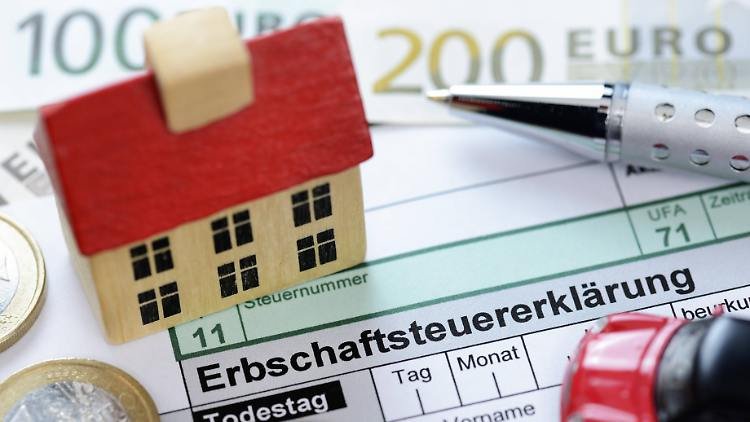
If several children inherit their parents’ home, inheritance tax is usually not an issue.
(Photo: imago / Christian Ohde)
Regardless of whether your parents inherit your home or an entire street with rental apartments: the tax office will be interested. When are heirs asked to checkout? And how can the Treasury be dealt with??
One in five Germans can expect an inheritance in the next two to three decades. This includes money and securities, jewelry, cars or memorabilia, but increasingly also real estate. Today, almost 60 percent of all 70- to 79-year-olds live in their own four walls, twice as many as in the late 1970s. And these houses and condominiums will eventually be transferred to the next generation. Real estate used by third parties also increases in inheritance importance, Deutsche Bank found in its inheritance and inheritance study from 2015. Regardless of whether you live in your own home or rent it out: Real estate often makes up a large part of the inheritance. When is inheritance tax due??
The subject of tax becomes relevant when the allowances are exhausted. Spouses inherit up to 500,000 euros, children up to 400,000 euros without having to share with the tax authorities. There are also smaller allowances for household items, art, collections or cars. If these values are not exceeded, the inheritance is tax-free, regardless of whether it is real estate, shares or antiques. You have to inform the tax office about the inheritance anyway, you have three months after the death.
Move in yourself and save taxes
Assume that the only child inherits a house for 350,000 euros and an additional 150,000 euros in other assets. Then it has to tax 100,000 euros – actually. If it was the parents’ home, the heir may avoid the inheritance tax. This is when he moves into the house himself and stays there for at least ten years. The rule applies to children, but also to the surviving spouse. In addition to the ten-year period, there is another condition for children: the living space must be less than 200 square meters. Inheritance tax is charged pro rata for larger apartments.
It is important that the testator himself lived in the house before his death. The only exception is if he was innocently prevented from doing so, e.g. had to move to a nursing home. If, on the other hand, you move into an apartment that the deceased had previously let, there is no way around the tax once the tax exemption has been exhausted.
For the surviving spouse, the self-use condition is usually easy to meet, as he usually already lives in the house. At best, it becomes problematic if he wants to move to a new partner or a smaller apartment, for example. For children, on the other hand, personal use is often a major hurdle. What use is the house in the Munich area if you yourself live in Berlin? What does the neat three-room apartment do if you already own it with family at home lives?
Those who move out earlier have to pay
You could of course think of using your parents’ inherited home as a second home or holiday home to save tax. But that doesn’t work, the Federal Fiscal Court made it clear in 2013. In the negotiated case, it was about the gift tax on the transfer during his lifetime, but it can also be transferred to inheritances. It is crucial that the center of family life is in the property, the court said.
And what if you are willing to actually live in the property yourself but have to move out before the ten-year period expires? Bad luck. If the apartment is sold or rented out, the tax office demands inheritance tax. There are no hardship regulations, for example for work-related removals. The only exception: the heir himself becomes a care case and has to move to a home.
When the tax gets too expensive
Anyone who inherits third-party real estate, such as rented apartments or entire apartment buildings, will not be able to avoid inheritance tax as soon as the allowance is exceeded. How high the tax is depends on the one hand on your own tax bracket and on the other hand on the value that is taxed. For example, if the heir is assessed in tax class one and has to tax up to EUR 75,000, a rate of seven percent applies. At 75,000 euros, the Treasury collects 5250 euros. Sounds manageable, but with larger inheritances it becomes much more expensive. Anyone who has to pay tax of around 500,000 euros will be fined 75,000 euros.
If the deceased has inherited enough cash, that’s not a problem. It could be difficult, however, if you inherit a property, but are not liquid enough to pay the tax. In this case, the tax office has an understanding. If you had to sell the property to pay the tax, you can pay off the debt in installments for up to ten years.
RELATED ITEMS
-

Inheritance tax – how much tax is really payable?
By: Redaktion December 11, 2018 Everyone who inherits more than the tax-free allowance must pay inheritance tax. It can be…
-
New section Who inherits what? , Planet knowledge. 24.06.2016. 02:09 min. Available until 06/24/2021. WDR. Inheritance and inheritance What do I have to inherit…
-

Inherit and inherit: what needs to be considered
Main content Those who do not regulate their inheritance are not only putting their blessing at risk. What needs to be considered when inheriting and inheriting and whether…
-

Stolen prams! When does the insurance pay
It is happening more and more frequently, especially in big cities: high-quality and expensive prams are stolen. How can you protect yourself from theft…
